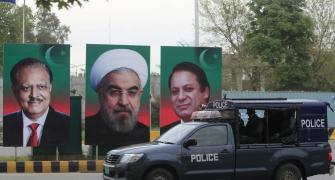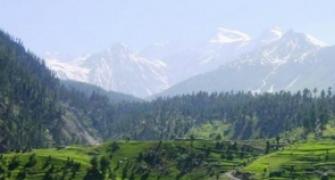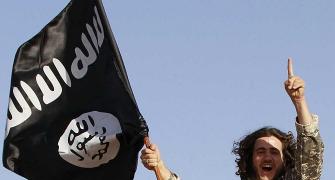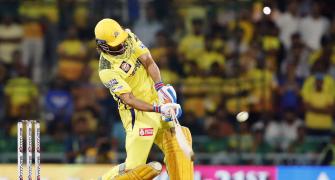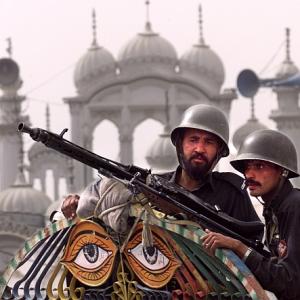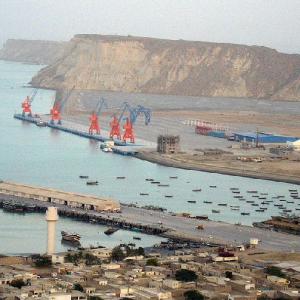In the year since Modi cast the spotlight on Pakistan's human rights violations in Balochistan, India has not done much more than raise the issue at the UN a few times.
Aveek Sen discusses India's Balochistan policy.
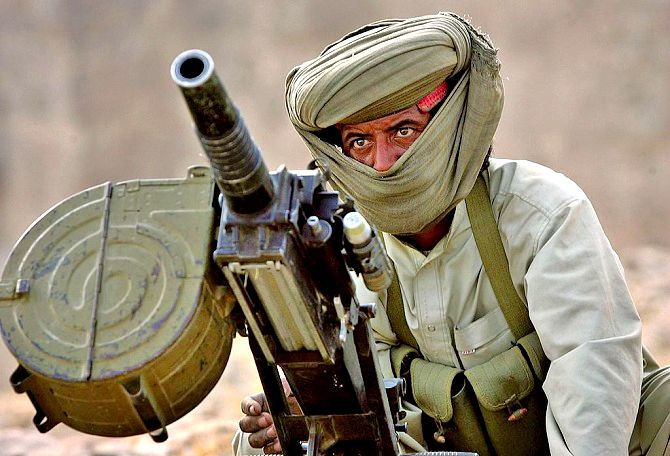
Photograph: John Moore/Getty Images
During his Independence Day speech last year, Prime Minister Narendra Modi mentioned Pakistan's human rights violations in Pakistan occupied Kashmir and Gilgit-Baltistan.
He went on to speak about Pakistan's human rights violations in Balochistan.
It led to heightened coverage in the Indian media for a few days.
Nothing much has been done by India since then other than raising the issues of Pakistan's human rights violations in Balochistan at the United Nations a few times, including under the Right of Reply.
The latest iteration of that was on June 7 at the ongoing UN Human Rights Council in Geneva, where India noted, 'Pakistan has systematically abused and violated the human rights of its own citizens,including in Balochistan.'
Soon after Modi's speech, Baloch separatist leader Brahumdagh Bugti had requested political asylum in India, but the request is still stuck in limbo.
Meanwhile, military operations against civilians in Balochistan intensified after Modi's statement.
But the ministry of external affairs press briefings didn't highlight this directly; it mentioned human rights violations in our neighbouring country only tangentially.
Much of the Indian media is privately owned, but even the state broadcasters, Doordarshan or All India Radio, only mentioned Balochistan on and off; they didn't cover Pakistan's human rights violations on Baloch civilians in any great detail.
The PM's Independence Day speech serves as an annual roadmap and diktat for bureaucrats and, by extension, the state news broadcasters.
However, work is stuck in red tapism and bureaucratic lethargy. The Balochi AIR service is in poor shape, and exists just in name.
I've often been told by my Baloch contacts that the usage of the language and the dialect won't be intelligible to the rural population in Pakistan's Balochistan.
Hopefully, over time, there will be an infusion of quality talent from the separatist Baloch activists who stay abroad.
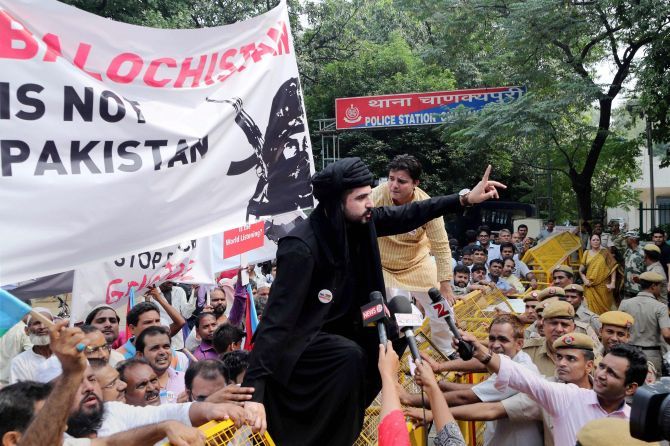
Some Baloch leaders also misread the PM's comments as to if he wants to go the full mile and reacted immaturely.
It is important to keep in mind that Afghan politicians and think-tanks have been speaking for years now on Pakistan's human rights violations in Balochistan, but they too have not gone the full mile.
It seems that India's Balochistan policy is very similar to Iran's policy on Yemen.
Iran's media goes on a propaganda offensive to bludgeon Saudi Arabia's war on Yemen.
Haykal Bafana -- a Yemeni lawyer; MD of the Bafana Advisory, a firm that guides companies on investment; and an occasional writer for The New York Times -- aptly described the situation in Yemen while referring to the Russian deputy foreign minister's recent comments on the Saudi plan to attack Hodeidah port & Sana'a.
'The Yemen card is useful for Moscow to play. But they have yet to invest anything in it, much like Iran's media hysteria of empty support,' he tweeted.
He had earlier commented, 'Indeed, Iran pisses me off. They don't send any weapons or help, but gloat over each Yemeni victory against Saudi Arabia as if THEY won.'
Similarly, when Pakistan intensified military operations on Baloch civilians after Modi mentioned Balochistan in his Independence Day speech -- for example, the month-long operation in Dasht town -- the Indian foreign ministry didn't even mention Pakistan's actions at any press briefing.
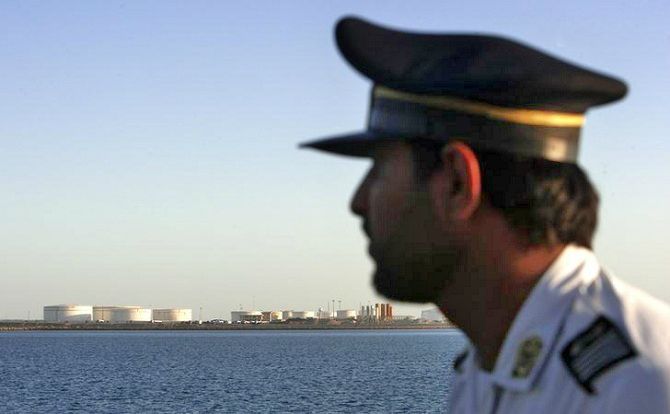
India is invested in developing a strategically important port here, and its stand on the Baloch freedom movement has the potential to impact ties with Iran.
Photograph: Raheb Homavandi/Reuters
A lot of other drama also unfolded when some sections of Indian analysts associated with think-tanks, retired bureaucrats and opportunist media fixers tried to milk easy PR money.
Instead of projecting political parties and leaders with massive ground support, shady individuals were projected.
This led to all the major Baloch separatist groups -- the Baloch Republican Party, the Baloch National Movement, the Free Balochistan Movement and Mehran Marri, the Baloch representative to the UNHCR and the European Union -- condemning the actions.
Some other politicians and intellectuals/public persons talked about using Balochistan as a card against Pakistan, whether with respect to Kashmir or the Kulbhushan Jadhav case.
This angered the Baloch, and led to separatist Baloch political activists pointing out that Balochistan shouldn't be used as a playing card -- that India should talk of Balochistan irrespective of other developments.
There are two points to be kept in mind here, as Kashmir and Balochistan are pretty different:
1. The legitimate counter to Pakistani propaganda on Kashmir is to highlight the situation in Pakistan occupied Kashmir and Gilgit-Baltistan.
2. Even in a war or propaganda war, there are human aspects. Certain things -- like an issue being played up as a counter to another -- even if true as a strategy should not be spelled out explicitly.
In this, the Indian government has shown a mature response and kept its cards very close to its chest.
It has done the right thing by not equating PoK with Balochistan.
PoK is Indian territory, which Pakistan is occupying illegally.
On the other hand, India isn't a party in Pakistan's occupation of Balochistan.
India's policy on Balochistan is something that analysts or people close to the decision makers have no inkling about yet. It is a closely guarded secret that only a few people in the government and bureaucrats dealing with it know of.
This, for now, seems to be very mature diplomacy and politics akin to the Iranians.
Aveek Sen is an independent journalist working on cyber security and the geopolitics of India's neighbourhood, focusing on Pakistan, Afghanistan, Iran and Bangladesh.
He tweets at @aveeksen
Also read: The Balochistan problem decoded
- 'Modi and the Indians just discovered the B-bomb'
- Why Modi played the Baloch card
- India only gives moral support to Balochistan
- India must do more to back Balochistan struggle


